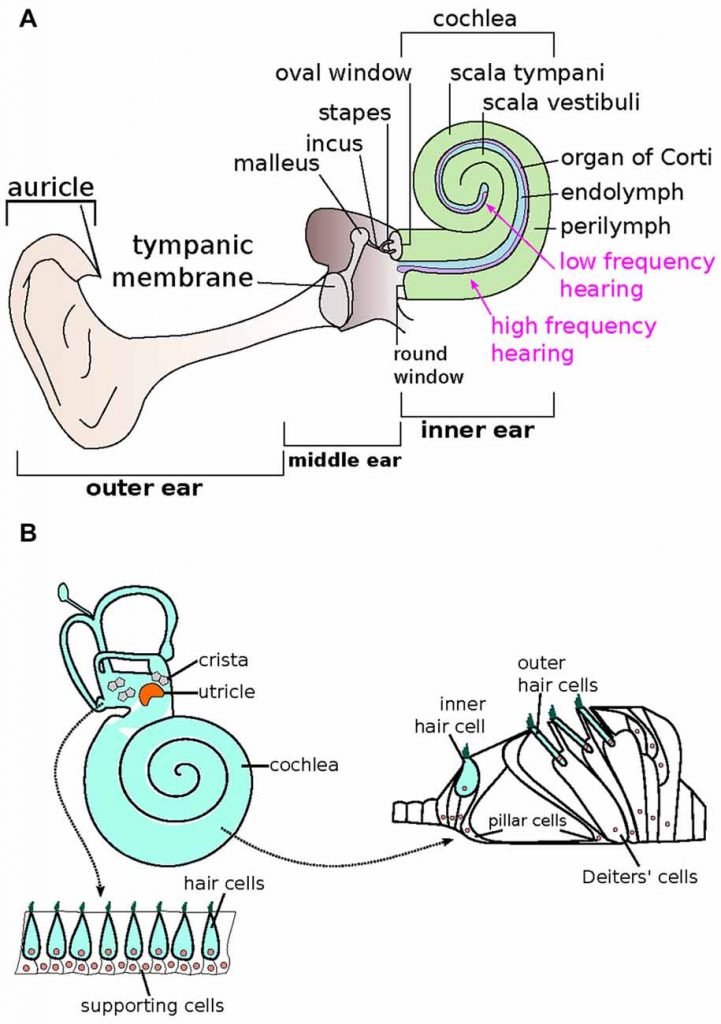One of the promising medical technologies that could at least partially restore hearing in some people with hearing loss is hair cell regeneration. This process refers to the ability to cause the cochlear hair cells to repair or replace themselves. Since the large majority of hearing loss is caused by damage to these hair cells, this technology offers great hope to many people with hearing loss.
December 2000 – Adult humans are unable to regenerate damaged hair cells. But birds are able to do it quite readily. Do our feathered friends offer hope that we may one day be able to regenerate human hair cells? Find out what the University of Washington Hair Cell Research has to say.

January 2001 – Progress in Hair Cell Regeneration
August 2001 – Hair Cell Regeneration Update from the House Ear Institute
July 2002 – From the 2002 SHHH Convention, here’s a report on Dr. Plubel’s Plenary Session on hair cell regeneration.
August 2002 – Hair Cells “Self-Renew”
November 2002 – Deafness Discovery Showed Inner Hair Cells Regenerated
June 2003 – Is this the holy grail of hair cell regeneration? Scientists at the University of Michigan have achieved hair cell regeneration in a mammal!
September 2003 – Hair cell regeneration and the related stem cell research offer what is probably the best hope for hearing restoration in the next few years. A reader who follows these developments just sent me four stories, each of which discusses promising medical discoveries. Two of the stories are late-breaking news and two are from earlier this summer. Here are a couple of paragraphs from each story and a link to the full article.
October 2003 – Here’s more breaking news on hair cell regeneration. Sound Pharmaceuticals has been issued a European patent for its hair cell regeneration treatment.
September 2004 – Here’s some more information on hair cell regeneration in mammals.
October 2004 – Here’s an update on hair cell regeneration status and an interview with Dr. Edwin W. Rubel.
November 2004 – “The Scotsman” is reporting on research at Sheffield University that may enable hearing restoration in the foreseeable future.
January 2005 – Concerned that the hype regarding hair cell regeneration may be inflating expectations, Dr. Neil Bauman offers his analysis of where hair cell regeneration stands and when we can expect it to be generally available.
January 2005 – Scientists have discovered a gene that inhibits hair cell reproduction, and have learned that turning off the gene causes hair cell proliferation.
April 2005 – Work at Indiana University causes more excitement about hair cell regeneration progress.
April 2005 – Scientists from the Medical Research Council (MRC) and the University of Hong Kong have isolated the gene responsible for sensory development in the inner ear.
June 2005 – Now that scientists have discovered the gene that inhibits hair cell reproduction, the next hurdle is developing a way to control that gene. Here’s an article about a new study that attempts to do just that!
September 2005 – The 2005 SHHH National Convention included a wonderful panel on the current state of hair cell regeneration.
January 2006 – Most hearing loss is due to damaged inner-ear hair cells, so scientists are exploring ways to boost their growth. Success could help fight deafness. Over the years, our ears take a beating. They’re assaulted with thunderous music, shrill sirens, blaring TV shows and the incessant background thrum of modern life. Little wonder that by middle age, millions of Americans suffer some degree of hearing loss, mostly due to the cumulative destruction of the delicate sound-sensing cells inside our ear from all this noise. Once these cells die, they’re gone forever and a hearing aid often lies somewhere down the road. But it may not always be that way. Full Story
April 2006 – Here’s the latest report on the hair cell regeneration work at Massachusetts General Hospital.
June 2006 – Scientists Show Mouse Ear Holds Potential for Cell Regeneration to Restore Hearing
August 2006 – Stem Cells May Be Key To Deafness Cure
~~~~~~~~~~~~~~
Progress in Hair Cell Regeneration
January 2001
As most of our readers probably know, most hearing loss is caused by deterioration of the hair cells in the cochlea. The hair cells move in response to acoustic energy entering the ear, and stimulate the auditory nerve with information regarding the characteristics of the incoming sound. Drugs, heredity, or loud noises can damage or destroy the hair cells, resulting in hearing loss.
We have known for some time that some animals (including many birds) can spontaneously regenerate damaged hair cells, but regeneration has never been observed in mammals – until now. The August 26, 2000 Issue of the British medical Journal Lancet reported successful regeneration of hair cells in a postnatal rat cochlea by introducing a particular gene (Math1) to the cochlea. Researcher Wei-Qiang Gao (Genentech, San Francisco, CA,USA) points out, “It wasn’t just a few hair cells–we had several hundred, so it’s robust production”.
The next step in the investigation is to determine whether similar techniques can regenerate hair cells in mature rats. Success in these experiments would bode well for eventual hair cell regeneration in humans.
Another possibility to replace damaged hair cells is transplantation. Matthew Holley (University of Bristol, UK) and his colleagues have developed an “ear in a test tube”, in which they have successfully grown mouse hair cells. Future advances may allow growth and transplantation of human hair cells.
~~~~~~~~~~~~~~~~
Hair Cell Regeneration Update from the House Ear Institute
August 2001
The House Ear Institute has been actively involved in the research on hair cell regeneration. They are pursuing two complementary strategies in hopes of understanding the regeneration process and how to induce it in humans. Here’s a link to an article describing their recent work.
http://www.hei.org/research/projects/cmb/haircellchall.htm
~~~~~~~~~~~~~~~~
Europe Issues Patent on Hearing Loss Treatment
October 2003
Editor: Here’s more breaking news on hair cell regeneration. Sound Pharmaceuticals has been issued a European patent for its hair cell regeneration treatment. Note that this development is only part of the required solution, and it doesn’t mean that a treatment will be widely available next week. But I think it is a big step towards viable hair cell regeneration. Here’s the press release.
~~~~~~~~~~~~~~~~~~~
Sound Pharmaceuticals, Inc. (SPI) announced that its patent “Method for the treatment of diseases or disorders of the inner ear” has issued in Europe, effective Oct. 1, 2003.
SPI has developed a novel strategy to stimulate auditory hair cell regeneration using proprietary cell cycle inhibition technology. Typically, auditory hair cells in mammals are not replaced when injured or lost. This results in permanent and often progressive sensorineural hearing a disease that affects over 30 million in the US. In non-mammals like birds, hair cell regeneration occurs through the spontaneous proliferation of the adjacent supporting cell. These newly proliferating supporting cells can go on to become replacement hair cells. However in mammals, auditory supporting cells do not proliferate or regenerate into hair cells even in the presence of growth factors.
SPI identified that p27Kip1, a cyclin dependent kinase inhibitor, prevents supporting cells from proliferating after embryogenesis. Compounds developed by SPI to inhibit p27Kip1 have been shown to stimulate supporting cell proliferation after drug or noise induced hair cell loss. “We are the only group that has demonstrated the ability to stimulate proliferative regeneration in the cochlea of mammals” says Dr. Jonathan Kil, President & CEO. “It is anticipated that this revolutionary technology will be critical in developing treatments to restore hearing in humans.”
Sound Pharmaceuticals, Inc. is a drug development company focused on treating hearing loss. To date, Sound Pharmaceuticals’ drug discovery program has identified targets for the prevention of hearing loss and for the improvement of hearing in individuals with hearing loss. For more information please visit http://www.soundpharmaceuticals.com
~~~~~~~~~~~~~~~~~~~
Promising Research on Hair Cell Regeneration
October 2004
Editor: For people interested in hearing loss “cures”, hair cell regeneration is the current best bet. It appears that virtually all animals except mammals regenerate hair cells on a routine basis. Dr. Edwin W. Rubel and his colleagues are among the researchers on the forefront of this exciting technology. “Hearing Review” recently published an interview of Dr. Rubel along with a synopsis of the research status. Here’s one question and answer from the interview. The complete article is available at:
http://www.hearingreview.com/Articles.ASP?articleid=H0410F01
~~~~~~~~~~~~~~~~~~~
Hearing Review: If hair cell regeneration is indeed possible, do you think this science will ever progress to a point where there will be full restoration of hair cells, or do you think that it’s far more likely we would see a partial restoration of hair cells in the inner ear?
Rubel: In my opinion, it’s not a question of if we will regenerate, restore, or protect hair cells, it’s a question of when. Because we now know that it’s possible, it’s only a matter of time until we can apply this science to humans. My best prediction is 10-20 years. I certainly hope to see it in my lifetime.
With respect to the degree of hair cell regeneration or restoration, my gut feeling is that it will all depend on what type of hearing loss a person has to begin with. One possibility for regeneration are people who have complete loss of hair cells due to some genetic anomaly, ototoxins, aminoglycosides, etc. In these cases, hearing care professionals may someday have a choice between recommending a cochlear implant versus an approach for growing enough hair cells where hearing aids could be used more effectively and provide much more acoustic information to that patient. As another example, you might see a patient who has a 50% loss of their outer hair cells. In this case, maybe we will be able to stimulate the regrowth and replacement of these “cochlear amplifier” cells.
~~~~~~~~~~~~~~~~~~~
Stem-cell researchers hope for deafness cure within 15 years
November 2004
Editor: “The Scotsman” is reporting on research at Sheffield University that may enable hearing restoration in the foreseeable future. Here are excerpts from the story.
SCIENTISTS hope that stem-cell research could lead to a cure for deafness in as little as ten years.
Researchers from Sheffield University are using embryonic stem cells in efforts to grow new cells in the inner ear.
Although in its early stages, the team from Sheffield University hopes it could lead to a cure for deafness in ten to 15 years.
Dr Rivolta added that his team hoped to undertake the first tests on animals in two years. “It could then be possible to do human trials in three to four years, but that would depend on the animal trials.”



